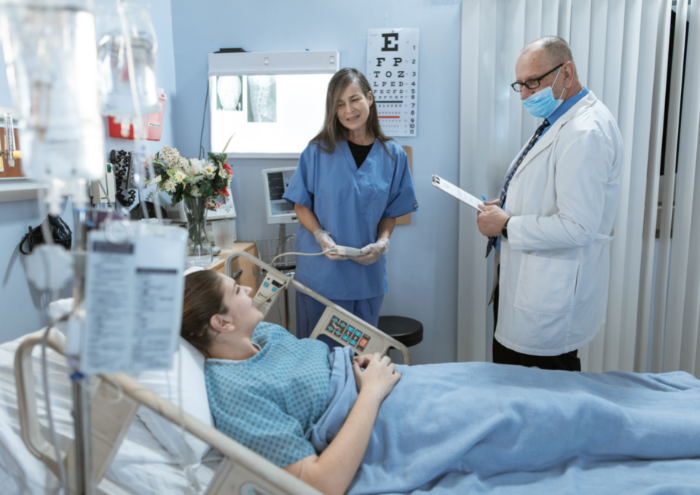Clinical trials: Everything you didn't know you needed to know
Not many people know that we run the UK's first and only Clinical Trials Support Service for people with blood cancer – helping patients get access to treatments they may have never known were available. But what is a clinical trial, and who are they available to? Read on to find out more...
Professor Andrew Pettitt
Andrew Pettitt is a Professor at the University of Liverpool and Consultant Haemato-oncologist at the Clatterbridge Cancer Centre.
In this blog, Andrew shares his knowledge, advice and insights around clinical trials.

As a blood cancer doctor and researcher, I am involved in clinical trials in different ways. In addition to advising my own patients about clinical trials and looking after them once they have gone into a trial, I am also leading a trial called PETReA which is investigating first-line treatment in follicular lymphoma and is recruiting patients across the UK and Australia. I also chair the National Cancer Research Institute (NCRI) Lymphoma Group, which oversees the development of new trials across all types of lymphoma. Finally, I myself have had medical treatment as part of a clinical trial so I can speak as a patient too!
Clinical trials are vital for clinical practice. I strongly believe that it should be part of routine care to offer patients the opportunity to take part in a clinical trial if one is available.
The benefits of clinical trials
There are direct and indirect benefits for people with blood cancer who take part in clinical trials. Patients may be able to access new treatments that are not available routinely, and these new treatments often turn out to be better than existing ones. Sometimes a clinical trial offers the only opportunity to receive treatment if no standard treatments are available.
When you are part of a clinical trial, you will get a lot of individualised attention from medical staff and research nurses who are well informed about the latest developments in your disease and its treatment. Many of my patients tell me this is a real plus.
I also find that a lot of people really like the idea that being on a clinical trial is helping the next generation of patients. Being part of a trial is adding to the knowledge we have about treating their type of blood cancer.
I know that many of my patients find being on a clinical trial is a positive experience because if they need further treatment they ask, “Do you have another trial for me?” They want their next treatment to be part of a clinical trial as well.
Concerns about clinical trials
A concern some people have is that they might be used as a guinea pig for new treatments that haven’t yet been proven to be safe and effective.
Although this can apply to phase I trials where entirely new treatments are being tested, lots of safety measures are put in place to minimise the risks. Also, phase II and III trials involve treatments that we already know a lot about and which carry much lower risks.
While they are part of a clinical trial, patients are monitored closely and may have extra tests, such as CT scans every 3 months or so. Some people see more tests as an inconvenience. But knowing that the cancer is being monitored and the doctors and nurses are looking after you is reassuring for many.

Breaking down the barriers
When people are presented with information about a clinical trial, it can be quite scary. For example, we usually provide them with at least three or four pages that list every possible side effect. It’s my job to put that into the context of my real-life experience of the treatment. I can often explain that most patients tolerate the treatment well.
I do not underplay the risks of treatment, but I try and put them into proportion and help patients understand these risks in relation to the potential benefits. You can’t eliminate risk but you can minimise it.
It’s also important to bear in mind the risk of what might happen if the blood cancer is not treated effectively. The challenge is often to find a way forward that carries the least overall risk, taking into account that we often don’t have all the answers. In fact, the whole point of doing clinical trials is to fill in these gaps in our knowledge!
Making clinical trials more diverse
We as health professional have to make sure that we give everyone the same access to trials, including people from Black and other ethnic minority backgrounds.
It’s dangerous to generalise, but there may be a suspicion of the medical profession in some communities. It’s important to give people with these concerns more support and reassurance that they are unlikely to come to any harm.
It can really help when people who have had a positive experience of clinical trials share their stories with their own communities. They will be a lot more influential than people like me!
At our hospital, we can introduce patients to other people with blood cancer who have been through a clinical trial. It helps if they share their experiences. Even if they had some difficult times on a trial, they can show that they came out the other end and that they are glad they took part.
Blood Cancer UK Clinical Trial Support Service
I think the support service is a great idea. Hospitals vary in the amount of advice and support that they can provide directly. Smaller hospitals may not have a clinical trials team dedicated to blood cancer.
It could be really useful for patients to have access to support beyond their hospital. Even when patients have a lot of local advice and support available, it might still be helpful for them to have access to somebody independent to give a ‘second opinion.’ Talking to the Clinical Trials Support Nurse could potentially help alleviate concerns.
Proactive patients
My advice to people with blood cancer is that if you are not offered a clinical trial you should ask if one is available.
At the end of the day, the decision to take part in a clinical trial is yours. A lot of people who have had their treatment as part of a clinical trial have found it a positive experience.
On balance, I would say that the benefits strongly outweigh the risks for most people. But it is an individual decision.

Contact our Clinical Trials Support Service
Get personalised support to understand which clinical trials are available - whether you're a patient, carer or healthcare professional.
